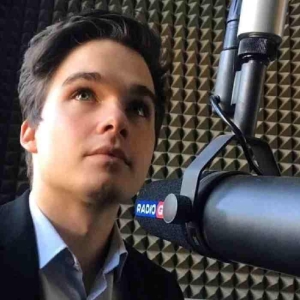
ongoing
Toward an integrative model of maladaptive Spontaneous Task-Unrelated Thoughts (STUT). Processual and functional approach.

principal investigator / project leader
Ph.D. / Assistant Professor
Psychologist, specializing in emotional regulation in mood disorders
Full bio project value: PLN 1,678,176
funding source: National Science Center
discipline: psychology
location: Katowice
duration: 2020 2021 2022 2023 2024
An international team of researchers from Poland and France will investigate why Spontaneous Task-Unrelated Thoughts (STUT) are a normal occurrence in some people, while in others may lead to repetitive negative thoughts and, in the long run, to psychological disorders.
The project is financed by the National Science Center, project number 2019/35/D/HS6/02364.
Project objectives
Spontaneous Task-Unrelated Thoughts (STUT) are an extensive category of mind-wandering (MW), including daydreaming, thought divagation, and rumination, i.e. repetitive negative thinking. STUT can be defined as an engagement in mentation that occurs unintentionally, and which is unrelated to one’s current activity and surroundings. This type of thinking might be considered as a normal, everyday life, mental activity. It happens to all of us, every day, and sometimes several times a day. However, some studies suggest, that under certain circumstances, it might be related to negative affect, lower life satisfaction and represents a risk factor for psychological disorders such as depressive disorders, i.e. one of the leading causes of disabilities among psychiatric disorders worldwide according to the World Health Organization (WHO). An important question remains: why for some people MW might be maladaptive, taking a form of negative repetitive thinking, and lead to increased risk of psychological disorders like depression and anxiety, while for others it is a normal activity not leading to negative consequences? In order to efficiently prevent negative outcomes of STUT, it is first necessary to verify what process or processes are responsible for this transition between normal everyday activity that happens to everyone and maladaptive STUT that increases the risk of psychological disorders.
Research that has been conducted so far, suggests that those factors might be linked to:
- The way of thinking about task-unrelated issues (whether this thinking is concrete, self-referent, future or past-oriented)
- Self-control and attentional resources (whether one is able to stop STUT, once one realizes that they are interfering with one’s ongoing activity)
- Trait disposition to use STUT or repetitive negative thinking
- The function that STUT might serve (for example planning or anticipating the future or escaping from a difficult or boring task).
However, all those factors identified in the literature have never previously been taken into account in one model, and most of the studies are focused only on one of those factors. The goal of this project is to create and empirically test an Integrative Model of Spontaneous Task Unrelated Thoughts that includes both processual (executive and attentional resources) and functional factors of STUT maintenance.
The goal of the project, which is carried out in cooperation with our colleagues from the University of Grenoble Alpes and the University of Savoie Mont Blanc, is to understand why, for some people, mind-wandering or daydreaming serve as adaptive processes that enable them to take a break from completing a difficult or boring task, while for the others this may lead to repetitive negative thinking, which is difficult to control. Testing an integrative model of the processual and functional factors responsible for this switch will help us to better understand repetitive negative thinking – one of the main risk factors in cognitive psychopathology.

Kornacka, Monika
Principal Investigator
Role in the Institute
{"funkcja-w-instytucie0":{"Funkcja":"Vice-Director","\u0141\u0105cznik":"of the","Nazwa w mianowniku":"Institute of Psychology "}}
Role in the Research Center
{"funkcja-w-centrum0":{"Funkcja":"Head","\u0141\u0105cznik":"of the","Nazwa w mianowniku":"Emotion Cognition Lab"}}
Specialization
Psychologist, specializing in emotional regulation in mood disorders
First and last name
Monika Kornacka
Academic degree or title
Ph.D. / Assistant Professor
Email
This email address is being protected from spambots. You need JavaScript enabled to view it.
Role in the Department
[]
Ph.D. / Assistant Professor Monika KornackaPsychologist, specializing in emotional regulation in mood disorders
Methodology
We will conduct three types of studies.
- A meta-analysis of existing literature to investigate what processual factors are responsible for the negative impact of maladaptive STUT on emotional regulation in participants' daily functioning.
- Testing, in ecological settings, the impact of those identified processual factors (STUT characteristics, executive and attentional functioning) on the momentary use of STUT. The key element here is the ecological character of the study – STUT will be evaluated during participants' everyday activity. The participants will be provided with a mobile application, which will ask them a series of questions several times a day, for 7 days. Furthermore, the participants will be equipped with a sensor (similar to a heart rate monitor) that will measure their heart rate variability, which will allow us to assess physiological proxy of STUT occurrence. The attentional and executive functions of the participants will be measured with the use of an eye-tracker.
- Investigating the function of STUT. The functional factors of STUT maintenance are directly linked to its adaptive vs. maladaptive outcomes and to the frequency of STUT occurrence. One of the main challenges in this study is the fact that the function of STUT (e.g. avoidance) is usually not conscious and thus, we cannot use only self-reported questions to assess it, but also an experimental procedure is needed. In order to be as close as possible to the ecological settings of everyday activity, but at the same time to be able to controll experimental settings in the laboratory, we will use virtual reality (VR) in Study 3. We will induce STUT in participants while they prepare for a stressful activity (e.g., public speaking in VR). We will measure whether STUT plays a planning or an avoidance role in this process. We will use, physiological (heart rate variability and eye-tracking), behavioral, and self-report measures of STUT.
Research team

Barnes, Steven
Specialization
psychologist
First and last name
Steven Barnes
Academic degree or title
Ph.D. / Assistant Professor
Role in the Research Center
{"funkcja-w-centrum0":{"Funkcja":"","\u0141\u0105cznik":"","Nazwa w mianowniku":"Emotion Cognition Lab"}}
Institute
Emotion Cognition Lab
Role in the Faculty
{"funkcja-na-wydziale0":{"Funkcja":"","\u0141\u0105cznik":"","Nazwa w mianowniku":"Faculty of Psychology in Katowice"}}
Email
This email address is being protected from spambots. You need JavaScript enabled to view it.
Role in the Department
{"funkcja-w-katedrze0":{"Funkcja":"","\u0141\u0105cznik":"","Nazwa w mianowniku":"Department of Clinical and Health Psychology"}}
Ph.D. / Assistant Professor Steven Barnespsychologist

Kopeć, Wiesław
Role in the Research Center
{"funkcja-w-centrum0":{"Funkcja":"","\u0141\u0105cznik":"","Nazwa w mianowniku":"Emotion Cognition Lab"}}
Specialization
psychologist
First and last name
Wiesław Kopeć
Academic degree or title
Ph.D.
Email
This email address is being protected from spambots. You need JavaScript enabled to view it.
Institute
Emotion Cognition Lab
Role in the Department
[]
Ph.D. Wiesław Kopećpsychologist

Krejtz, Izabela
Role in the Faculty
{"funkcja-na-wydziale0":{"Funkcja":"","\u0141\u0105cznik":"","Nazwa w mianowniku":"Faculty of Psychology in Warsaw"}}
Role in the Department
{"funkcja-w-katedrze0":{"Funkcja":"","\u0141\u0105cznik":"","Nazwa w mianowniku":"Department of Clinical Psychology"}}
Role in the Institute
{"funkcja-w-instytucie0":{"Funkcja":"","\u0141\u0105cznik":"","Nazwa w mianowniku":"Institute of Psychology"}}
Role in the Research Center
{"funkcja-w-centrum0":{"Funkcja":"","\u0141\u0105cznik":"","Nazwa w mianowniku":"Interdisciplinary Center for Applied Cognitive Studies"},"funkcja-w-centrum1":{"Funkcja":"","\u0141\u0105cznik":"","Nazwa w mianowniku":"Eye Tracking Research Center"}}
Specialization
psychologist, specializing in determinants of wellbeing and eye-tracking research
First and last name
Izabela Krejtz
Academic degree or title
Ph.D. / Associate Professor
Email
This email address is being protected from spambots. You need JavaScript enabled to view it.
Position
profesor uczelni
Ph.D. / Associate Professor Izabela Krejtzpsychologist, specializing in determinants of wellbeing and eye-tracking research

Skorupski, Michał
First and last name
Michał Skorupski
Academic degree or title
Doctoral student at SWPS University
Specialization
psychologist
Institute
Emotion Cognition Lab
Role in the Research Center
{"funkcja-w-centrum0":{"Funkcja":"","\u0141\u0105cznik":"","Nazwa w mianowniku":"Emotion Cognition Lab"}}
Role in the Department
[]
Doctoral student at SWPS University Michał Skorupskipsychologist
Practical applications of results
Research carried out in this project and the development of an Integrative STUT Model that includes processual and functional factors of maintenance will provide, in the long term, a solid theoretical foundation for further basic research on STUT. The development of an integrative model should be helpful in determining what factors, precisely, lead to maladaptive STUT that impairs one’s emotional regulation. This, in turn, will improve the efficiency of preventing and treating maladaptive STUT, which is one of the risk factors for psychological disorders.